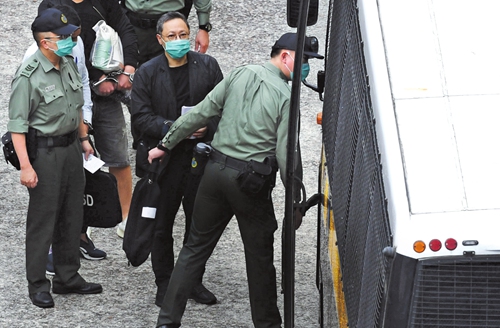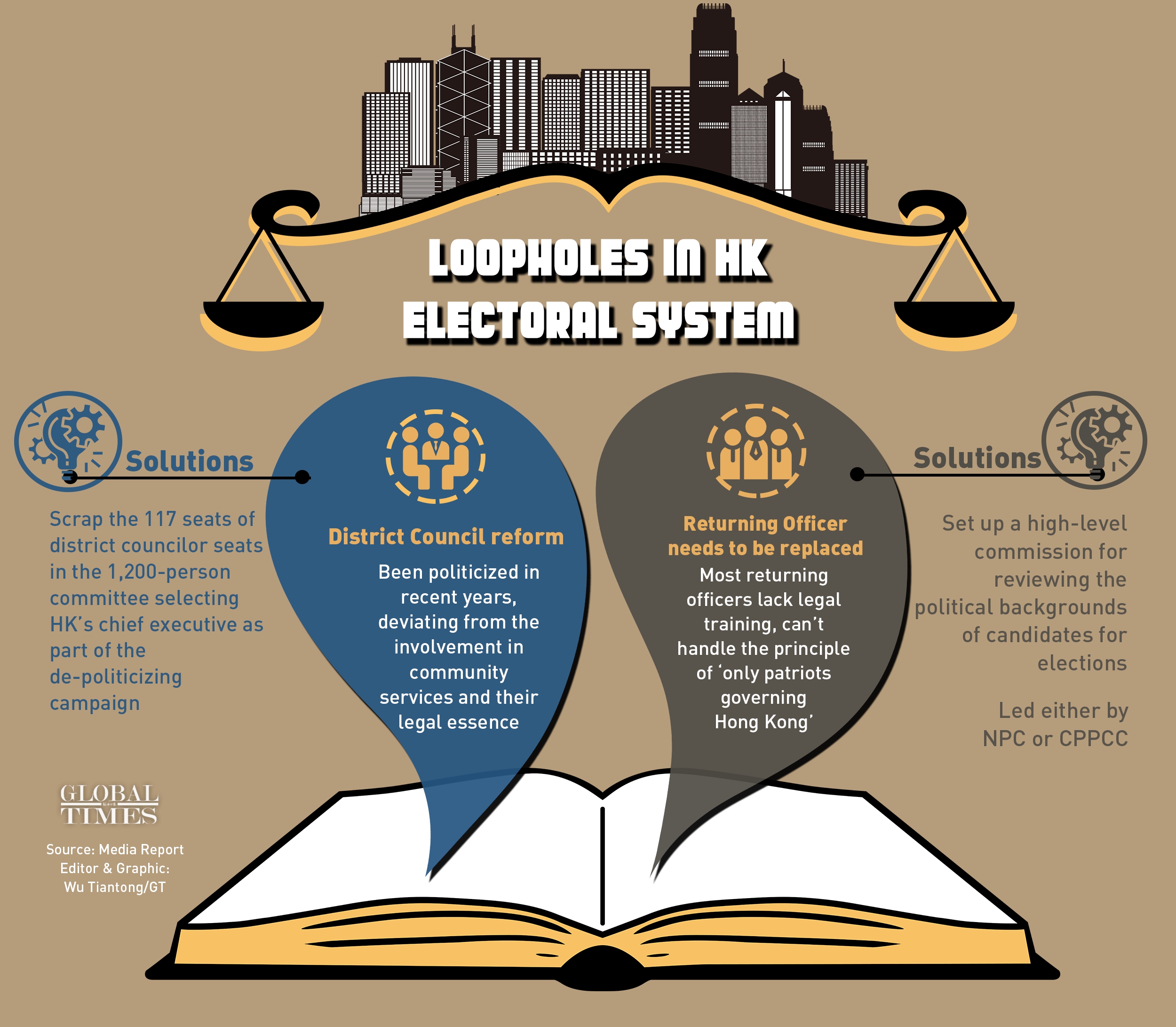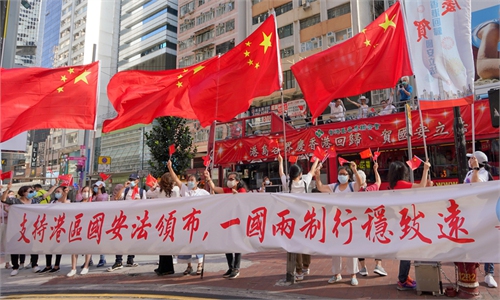HK electoral system overhaul a highlight of two sessions
To understand principle of only patriots governing HK, it's time to clarify misperceptions about CPC: insiders
Ahead of China's most important annual political event that kicks off on Thursday, an overhaul of Hong Kong's electoral system is expected to top the agenda, raising considerable public discussion about how to define patriotism and interpret love for the Communist Party of China (CPC)-led country, the essence of which has been proposed as fundamental for the principle of only patriots governing Hong Kong.
While some Western media and some radical anti-government forces in Hong Kong are trying to stir up anti-CPC sentiment in Hong Kong society by demonizing the ruling Party, local scholars and political representatives said it is time to correct some long-term misunderstandings in Hong Kong society about the relationship between the ruling Party and the country, clarify fundamental standards for being a patriot who holds public governance power in the city, and refute wrong claims made by some Western critics and media coverage of the upcoming reforms.
CNN recently ran an article headlined "Hong Kong's new loyalty oath requires all lawmakers to love China - and the Communist Party," and The Washington Post said in article that "China uses patriotism test to sweep aside last outlet for Hong Kong democracy." Reuters, in an explainer story, asked "What is love? Beijing desires unconditional loyalty from Hong Kong."
Those reports came as top central government official on Hong Kong affairs, Xia Baolong, made a speech twice within one week concerning the principle for local governance, unleashing important messages about the imminent reform of the city's electoral system that is expected to be discussed during the two sessions. However, those Western media, once again, failed to understand the true meaning of Beijing's messages.

Hong Kong scholar Benny Tai Yiu-ting is transferred to court on Tuesday in Hong Kong. He is one of 47 people charged by the Hong Kong Police Force on Sunday for involvement in illegal primaries and conspiring to subvert state power. Photo:cnsphoto
Setting bottom line
Xia's speech about only patriots governing Hong Kong outlined detailed conditions for being a patriot who governs the city, including not only the city's chief executive but also major officials of the Executive Council, LegCo lawmakers, returning officers and all-levels of judges. He urged Hong Kong officials to understand "one country, two systems" correctly and comprehensively by not challenging the bottom-line of the country, Regina Ip Lau Suk-yee, a member of the Executive Council, told the Global Times on Tuesday.
"It's about correctly understanding the relationship between the central government and Hong Kong, and there's no single word mentioning that a patriot has to love the CPC," she said.
While critics cited by some Western media said that the reforms demand nearly "total obedience," crush the city's so-called "democracy" and further marginalize the pan-democratic group, some local scholars in Hong Kong said that such interpretations deliberately misread the real meaning of Xia's messages.
There was no requirement to love the Party in Xia's speech. He emphasized respect for the constitutional order of Hong Kong since its return to the motherland, given that the socialist system is the fundamental political system of China and the leadership of the CPC is the most essential characteristic of socialism with Chinese characteristics, and this cannot be damaged by any individual or organization, Lau Siu-kai, vice-president of the Chinese Association of Hong Kong and Macao Studies, told the Global Times in a recent interview.
"We can interpret his remarks from a perspective of 'a Negative List', which means you don't have to genuinely love the Party or believe in communism or socialism, but you can't take actions that try to change a China led by the CPC," Lau said.
Xia, the top official overseeing Hong Kong affairs, said in his speech on February 22 that "there can be different political views, but there's a red line, that is we will never tolerate any acts that hurt the fundamental system of the country, namely, the socialism led by the CPC."
Influenced by Western culture and values, especially in the post-WWII world that was divided between the communist and the capitalist world, many people in Hong Kong have certain fears about the CPC, Ip said, noting that many of the first generation of immigrants from the Chinese mainland were capitalists from Shanghai.
"But more importantly, the relationship between the Party and the country has not been fully explained and discussed in Hong Kong society, which has become a topic being avoided," Ip added.
By manipulating such complex public sentiment on the CPC in the wake of Western-led rhetoric offensive against the CPC, radical anti-government forces in Hong Kong have been attacking the Party intensely, instigating hatred toward the ruling Party. Some radical political figures such as former lawmaker Wong Yuk-man and Tam Tak-chi, vice chairman of the pro-democracy group People Power, have openly advocated to crack down on the leadership of the CPC, referring to it as "tyranny."
Xia's speeches send different messages to three major types of people in Hong Kong, and one group is the radical opposition. If they continue crossing the redline, they will face a miserable outcome, Lau noted. "While for the general public, given that "one country, two systems" principle remains unchanged, as long as they don't get involved in any practices that endanger national security, their rights of freedom of speech won't change," he said.
Ip agreed with this interpretation, as she sees Hong Kong remaining a society ruled by the common law system, which guarantees the basic rights of Hong Kong residents. "You can criticize the CPC, but you can't turn those critics into actions that subvert state power," she said.

Loopholes in HK electoral system Infographic: Wu Tiantong/GT
Imminent reforms
While the upcoming political reforms will not turn into a restriction of public opinion or complete elimination of opposition groups, they have higher requirements for those who take office or intend to hold public power, who need to be the patriots with a firm stance. The reforms indicate a new direction for pan-democratic groups to continue their political paths, which are expected to become a loyal opposition, observers said.
Contrary to The Washington Post, which said that "China moves to quash the territory's last avenue of democracy," Ip said that opposition groups in Hong Kong have room for existence as long as they do not challenge the country's bottom-line.
Some officials from Western countries called for the release of 47 arrested anti-government figures, ignoring the fact that some former lawmakers and political figures among them have violated the national security law and some severely challenged the redline of local governance, and have already been barred from continuing their political paths and cannot be considered as "representatives of so-called democratic pursuits," according to observers.
Those who take office in Hong Kong need to be patriots with a firm stance, which means they will not dodge on their political position and will have the courage to fight back against the unilateral sanctions and groundless critics from the West amid growing rivalry between China and the US, Ip said.
After thoroughly listening to public opinion from Hong Kong society on imminent political reforms, Chinese policymakers are expected to come up with a consensus on how to plug the loopholes in existing systems and why it is necessary to carry on the reform process as soon as possible after the two sessions starts on Thursday.


